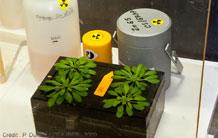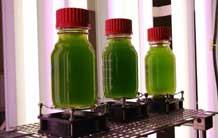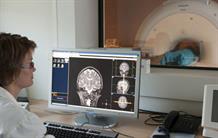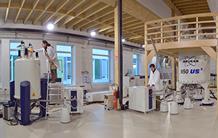Bioenergy
Scientific objectives: energy and health
Published on 16 October 2015
Body text 1
The objective of the Division of Life Sciences (DSV) of the CEA is to advance knowledge in the fields of energy and health, and to foster technological innovation.
Five programs coordinate the research conducted in the
institutes of the DSV and ensure continuity between the exploratory process and application development.
DSV energy objective
 |
In support of its historical activities in the nuclear sector, the CEA has developed expertise in radiobiology and nuclear toxicology. Today this allows the DSV to study the impact of nuclear activities on humans and the environment at the highest level. Similarly, the DSV has implemented for the past decade targeted actions in toxicology to accompany energy applications of nanomaterials (nanotoxicology). |
- Characterize the effects of high and low doses on stem cells, DNA repair mechanisms, and individual radiosensitivity factors
- Improve the safety of radiotherapy and expand its fields of application
- Develop treatment solutions in case of radionuclide contamination of humans (decorporation) or the environment (bioremediation)
|
Biotechnologies now have the scientific maturity to propose high-potential devices to respond to the challenges of low-carbon energies and energy-efficient industrial processes. They rely on bioenergetic control mechanisms, and more generally on the mechanisms of biological oxidation-reduction, as well as exploration of the diversity of metabolic pathways of microorganisms. |
 |
- Design low-cost bio-inorganic catalysts that are highly efficient and sparse in rare metals, for the production or use of hydrogen
- Develop strains of photosynthetic organisms and industrial processes for a sustainable and competitive third generation biofuels sector
- Formulate economical, bio-inspired or biotechnological synthetic methods for the biofuel or fine chemical sectors
DSV health objective
 |
Imaging, structural biology, large-scale biology, high-throughput screening, and preclinical models are all skills and tools of the DSV for use in the multi-scale study (i.e. molecule, cell, organ, and organism) of normal and pathological biological phenomena. Teams from the DSV are accordingly devoted to working on cancer and infectious, neurodegenerative, or genetic diseases. |
- Develop the knowledge base for fundamental mechanisms of biological functions
- Identify biomarkers to monitor the beginning and long-term evolution of pathologies
- Identify new therapeutic targets (molecular sites, genes, and cells)
|
The DSV benefits from its fundamental research and skills (chemistry, isotopic labeling, imaging, etc.) to propose innovative approaches in the areas of diagnosis, therapy and prophylaxis. These innovations must contribute to the development of personalized medicine, by allowing physicians to anticipate managing diseases, to avoid ineffective treatments for some patients, and to have more easily tolerated therapies at their disposal. |

|
- Develop more sensitive, rapid, and specific diagnostic tests
- Develop new vaccine and therapeutic strategies (i.e. molecular, cellular and genetic), and evaluate them until the preclinical stage
- Contribute to the emergence of personalized medicine tools
DSV technological innovation
 |
The interface between biology and technology is a reservoir of innovation that the DSV, by its multidisciplinary culture, has exploited since its creation. At the DSV, computer scientists, chemists, physicists and biologists develop new methods for exploring life. This is a question of enhancing the opportunities offered by research instruments, in order to make this exploration increasingly efficient.
This positioning within methodological, procedural, instrumental and software innovation is a specific signature of the DSV, nationally recognized by the award of a mission to lead several major facilities, from the “Investissements d’Avenir” Program. |
- View organs in operation
- Analyze biological processes on a large scale
- Understand the dynamics and structure of macromolecules within the complexity of the cell
Top page